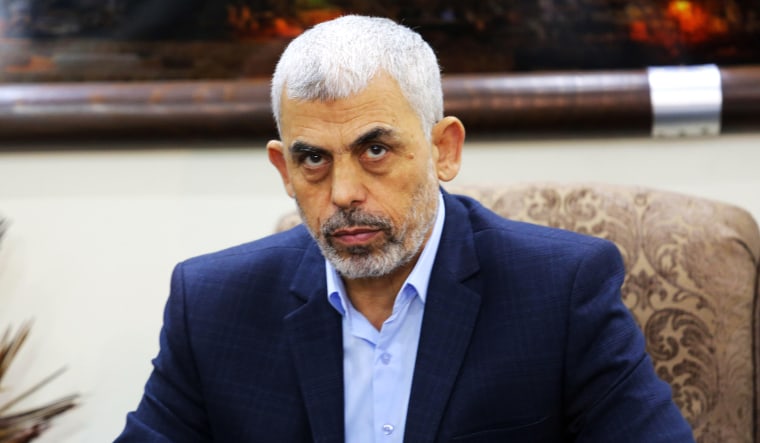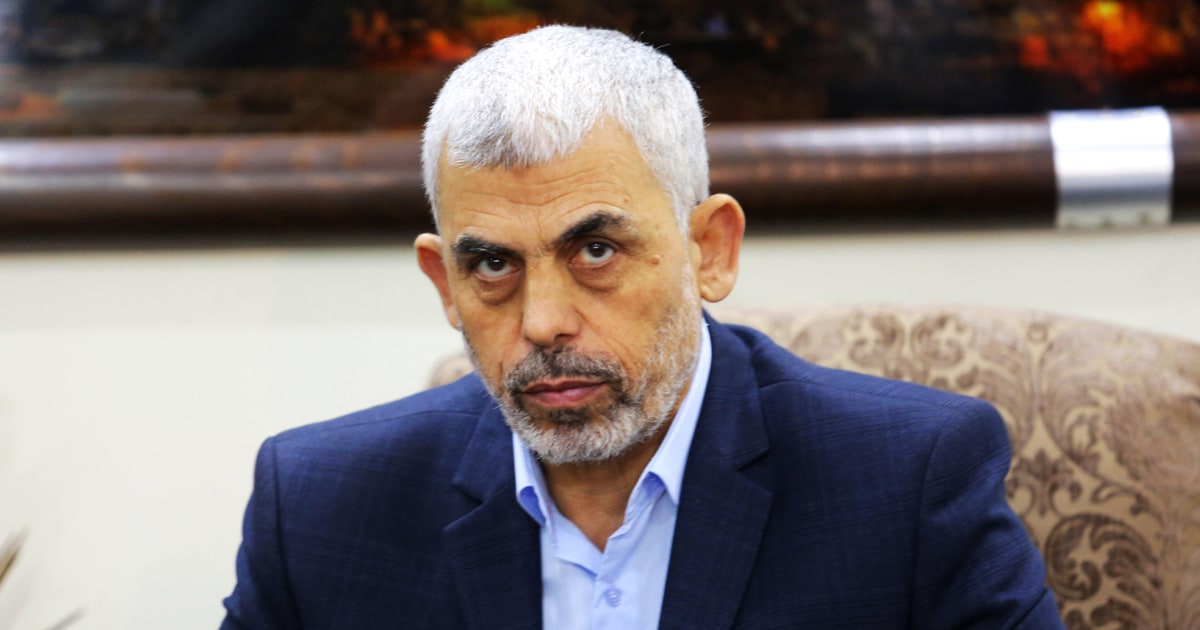The killing of Hamas’ leader Yahya Sinwar represents a major symbolic and military victory for Israel a year after the hardline ideologue masterminded a devastating terrorist attack that shattered the country’s sense of security.
But it’s unclear if Sinwar’s demise will open the door to the release of Israeli hostages still held by Hamas, end the war in Gaza or defuse the broader tensions between Israel and Iran, former U.S. officials and regional analysts say.
Having severely weakened Hamas, its Hezbollah allies in Lebanon and its patrons in Iran, Israeli Prime Minister Benjamin Netanyahu has a rare window of opportunity to turn his country’s military successes into lasting diplomatic deals, former officials said.
“It’s a test of Israeli leadership,” said Bruce Riedel, a former CIA officer and national security official who focused on the Middle East. “It is an opportunity for Israel to declare victory and accept a cease fire. A ceasefire in Gaza could lead to a reduction in regional tensions.”
Sinwar has been in Israel’s sights ever since Hamas fighters breached Israel’s southern border on Oct. 7, 2023, in a surprise attack that left some 1,200 Israelis dead, most of them civilians. More than 200 others were taken hostage.
But after a year-long manhunt, including help from U.S. intelligence agencies, Israeli troops stumbled upon the Hamas leader during a routine patrol, Israeli officials said.

Biden administration officials viewed Sinwar as an uncompromising, ruthless figure who was unmoved by the suffering and the deaths of more than 40,000 Palestinians as a result of Israel’s retaliation for the Oct. 7 attack.
During months of indirect negotiations for an elusive hostage release agreement and a ceasefire deal in Gaza between Israel and Hamas, Sinwar was often seen as an obstacle to freeing the hostages, which he saw as the ultimate bargaining chip, current and former U.S. officials said.
The Biden administration “had largely come to the conclusion that, as long as Sinwar was there, there was no possibility of a hostage deal,” Dennis Ross, who shaped Middle East policy under three presidents, said in a virtual briefing organized by the Washington Institute for Near East Policy.
Now a ceasefire, the return of hostages and even the withdrawal of Israel Defense Forces from Gaza could be within reach, former officials said.
Hamas’ military losses, the destruction of much of its tunnel network and the death of its longtime chief in Gaza could breathe life into proposals to create a new political governing arrangement for the Gaza Strip and the deployment of a multinational peacekeeping force, which would allow Israeli forces to exit, said Ross, now a fellow at the Washington Institute for Near East Policy.
“The Emiratis have already said publicly that they’re prepared to be part of such a stabilization force,” Ross said. “This could be the moment where the (Biden) administration wants to try to act on that.”
After Sinwar’s death was confirmed, Secretary of State Antony Blinken said the Biden administration plans to renew efforts with allies and partners to end the war in Gaza and “chart a new path forward.”
“In the days ahead, the United States will redouble its efforts with partners to end this conflict, secure the release of all hostages, and chart a new path forward that will enable the people of Gaza to rebuild their lives and realize their aspirations free from war and free from the brutal grip of Hamas,” Blinken said.
Blinken has been in discussions with Israel and the UAE as well as other partners on a post war plan for Gaza, State Department spokesperson Matthew Miller told reporters. He is due to depart for Israel within days.
In the past, the killing of the leaders of extremist groups in Gaza or elsewhere in the Middle East has tended to produce only temporary advantages for Israel, without dealing a permanent defeat or changing the calculus of either side in the conflict, according to former intelligence officers and analysts.
“I think we ought to take a deep breath here,” said Aaron David Miller, a senior fellow at the Carnegie Endowment for International Peace. ”I don’t believe in game changers, transformations. This region has a way of grinding up attacks that appear to be transformational.”
It’s an open question whether Sinwar’s death will fundamentally alter the course of the conflict between Israel and Hamas or lead Prime Minister Netanyahu to pursue an ambitious diplomatic agenda that could antagonize far-right members of his fragile ruling coalition, according to Miller.
“He’ll talk in transformational terms. But he is, by definition, a transactional player, particularly when it comes to doing nothing that would jeopardize the imperative of staying in power,” Miller said.
The prime minister welcomed Sinwar’s killing on Thursday without mentioning a possible ceasefire or hostage release talks.
“We have settled the score,” Netanyahu said in a recorded video statement, adding “our task has still not been completed.”
“To the dear hostage families, I say: this is an important moment in the war. We will continue full force until all your loved ones, our loved ones, are home.”
A long term blow?
The killing of Hamas’ hardline leader in Gaza has delivered a major blow to the group, which had already suffered massive losses in the face of an Israel air and ground offensive launched after the Oct. 7 attack, current and former officials and experts said.
“With its leader killed, the organization is a headless body, and will struggle to regroup under such pressure,” said Burcu Ozcelik, a senior research fellow at the Royal United Services Institute, a London-based think tank. “Some elements in Hamas will be emboldened to punish Israel for Sinwar’s killing, but the reality is that the group has been decapitated and it will be difficult to come back from this.”
Current and former intelligence officers say Hamas still has thousands of armed militants on the ground and will now focus on shoring up its depleted capabilities.
“Hamas will be able to reconstitute itself, not in a day, not in a week . . . but certainly enough to be a major actor as a spoiler and as an insurgency,” said Ghaith Al-Omari, a former Palestinian Authority negotiator.
Amid a power vacuum in Gaza, Hamas’ center of gravity may now shift to political leaders based in Qatar, who are more pragmatic about cutting a possible ceasefire deal with Israel, he said.
Sinwar, who grew up in a refugee camp in Gaza, spent 22 years imprisoned in Israel over the abduction and killing of two Israeli soldiers and four Palestinians deemed to be collaborating with Israel.
As a prisoner, Sinwar learned Hebrew, read Israeli newspapers and tried to use his time behind bars to understand his enemies. He was one of the masterminds of the Oct. 7 attack that featured the killing of unarmed civilians and abduction of children and the elderly.
But his vision of wrecking Israel with the help of Iran and other proxy forces backfired badly.
Since the attack, Israel has decimated Hamas, killed the leadership of the Lebanese militia Hezbollah and successfully fended off two missile barrages from Iran. Gaza is now in ruins, and more than 42,000 Palestinians have been killed in the conflict, according to Palestinian health authorities.
One of the hostages taken by Hamas on Oct. 7 was an 85-year-old peace activist, Yocheved Lifshitz, who was later released. She recounted to the Israeli newspaper Davar encountering the Hamas chief in the maze of tunnels under Gaza.
“I asked him how he wasn’t ashamed to do something like this to people who have supported peace all these years,” she said. “He didn’t answer us. He was silent.”

Leave a Reply